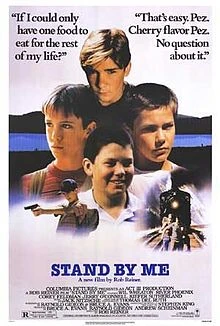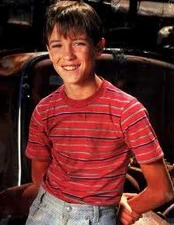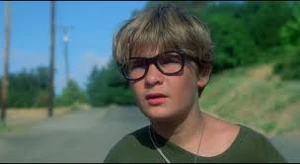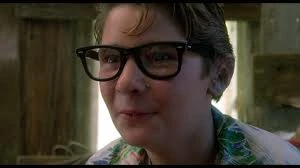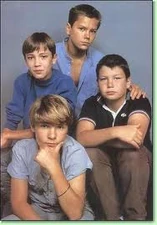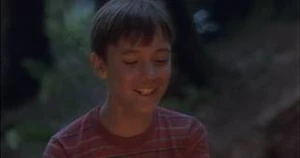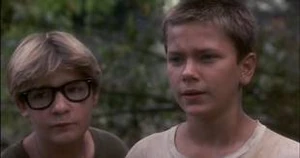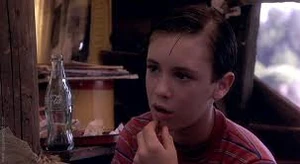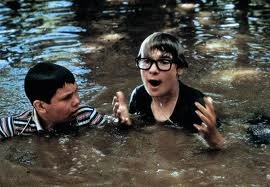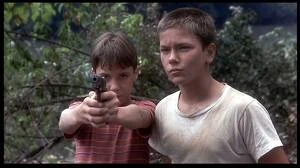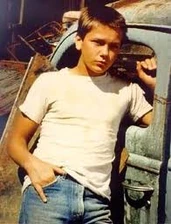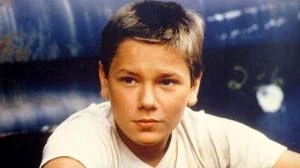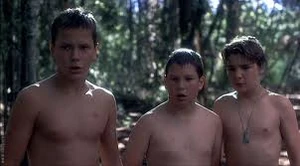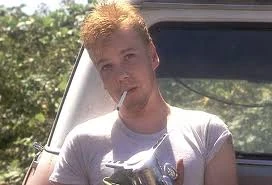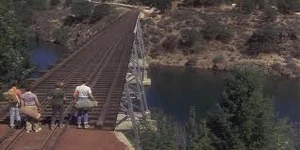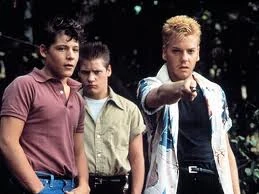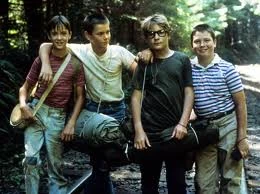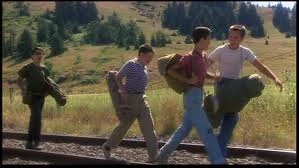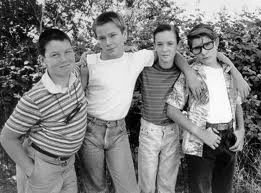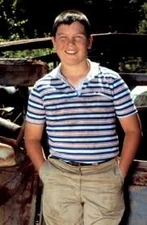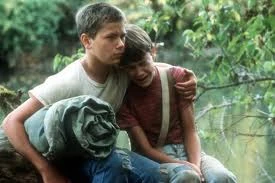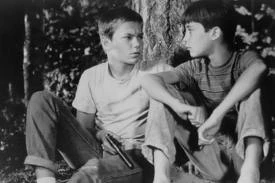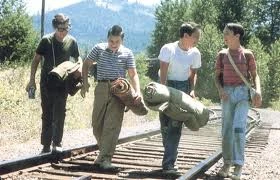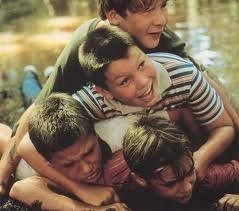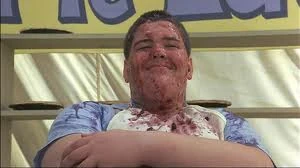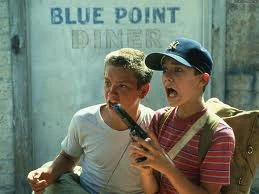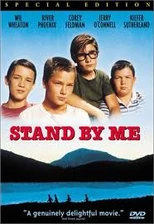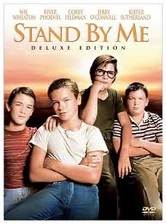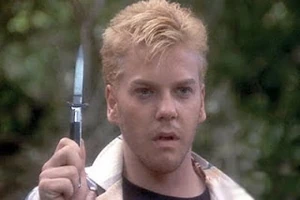Stand By Me is the 1986 American coming of age drama film adaptation of Stephen King's The Body.
| Stand By Me | |
|---|---|
| Directed by | Rob Reiner |
| Produced by | Bruce A. Evans |
|
Based On |
Andrew Scheinman Raynold Gideon Bruce A. Evans |
| Starring |
Wil Wheaton |
| Music by | Jack Nitzsche |
| Cinematography | Thomas Del Ruth |
| Editing by | Robert Leighton |
| Distributed by | Columbia Pictures |
| Release |
August 8th, 1986 (Limited) August 22nd, 1986 (Wide) |
| Running time | 88 Minutes |
| Country | United States |
| Language | English |
| Budget | $8 Million |
| Gross revenue | $52,287,414 |
It was written by Raynold Gideon and Bruce A. Evans and directed by Rob Reiner.
It features Wil Wheaton as the titular narrator boy Gordie LaChance and Richard Dreyfuss as the older actual narrator of the story Gordon, River Phoenix as Christopher Chambers, Kiefer Sutherland as Ace Merrill, Corey Feldman as Theodore "Teddy" Duchamp and Jerry O'Connell as Vern Tessical (full name).
It is absent of bully gang characters Fuzzy Ball and Frank Chambers and does not share the same title as Stephen King's story as Columbia Pictures, its distributing studio, did not agree with the title.
Plot
The film is narrated by an author, Gordie Lachance (Richard Dreyfuss), writing the memoir about his youth. Set in the fictional town of Castle Rock, Oregon, over Labor Day weekend in September 1959 young Gordie (Wil Wheaton) is a quiet, bookish boy with a penchant for telling stories and writing. He is rejected by his father, following the death of his football-star older brother Denny (John Cusack) in a jeep accident. Denny paid Gordie much more attention than his parents did.Gordie spends his time with three friends: Chris Chambers (River Phoenix) who is from a family of criminals and alcoholics and is usually stereotyped accordingly, even though he does not conform to the perceptions and stigmas attached to his family; Teddy Duchamp (Corey Feldman) who is eccentric and physically scarred after his mentally unstable father held his ear to a stove; and Vern Tessio (Jerry O'Connell) who is overweight and timid and often picked on.Gordie, Chris and Teddy learn from Vern that Ray Brower's dead body has been found, apparently killed after being struck by a train. Ray Brower was a young boy whose death and subsequent police search created a big news story in Castle Rock. Vern overhears his older brother Billy (Casey Siemaszko) and his friend Charlie Hogan (Gary Riley) talking about finding the body while dumping a stolen car. So the younger boys decide to embark upon a journey to see if they can find it and become local heroes.They set out to find the body, first encountering Milo Pressman and his dog Chopper, when they pause to fill their canteens from a well located in his junkyard. They then walk along a train bridge and Vern and Gordie are nearly run over by a passing train. At the end of the day, the boys set up camp and Gordie tells the boys a story he had been thinking of. Later on in the night, Chris reveals to Gordie his fear of being stereotyped as a criminal and never making anything of himself. As they continue they take a short-cut through a swamp only to discover that it is infested with leeches. While desperately removing them from each other, Gordie faints after finding one in his underpants, causing the other boys to wonder if they should go on. Gordie ends up being the decisive one, knowing that they have put in too much work not to see the body.They locate the boy's dead body and it reminds Gordie that his father liked his brother better than him. At this point, local bully "Ace" Merrill (Kiefer Sutherland) and his gang ("Eyeball" Chambers (Bradley Gregg), Vince Desjardins (Jason Oliver), Charlie Hogan, Billy Tessio and two other hoods) show up in their cars to take the body, but Gordie threatens Ace with a handgun that Chris had brought on the trip. (This is in retaliation to an earlier confrontation when Ace took Gordie's New York Yankees baseball cap which was a gift from Denny.) Gordie decides that no one will get credit for finding the dead body and report it found via an anonymous phone call to the authorities.The film ends with the boys returning home to Castle Rock and saying goodbye to each other. The narrator states that Vern later married straight out of high school, had four children and became a fork-lift driver at a local lumber yard. Teddy tried to join the Army, but, because of his poor eyesight and ear injury, was refused entry. He eventually served jail time and now was doing odd jobs around Castle Rock. Chris was able to stick it out and get by in the advanced classes with Gordie and later moved out of Castle Rock and became a lawyer. However, it is revealed that Chris was recently stabbed in the throat and died breaking up a fight.
Gallery
Production
In a 2011 interview with NPR, Wil Wheaton attributed the film's success to the director's casting choices: "Rob Reiner found four young boys who basically were the characters we played. I was awkward and nerdy and shy and uncomfortable in my own skin and really, really sensitive, and River was cool and really smart and passionate and even at that age kind of like a father figure to some of us, Jerry was one of the funniest people I had ever seen in my life, either before or since, and Corey was unbelievably angry and in an incredible amount of pain and had an absolutely terrible relationship with his parents." Parts of the film were shot in Brownsville, Oregon, which stood in for the fictional town of Castle Rock. Scenes that include the mailbox baseball and the junkyard scenes were filmed in Veneta, Oregon. The junkyard is still in operation. The campout/standing-guard scene was filmed in Eugene, Oregon, just a few miles from Veneta. The general store is in Franklin, Oregon, just north of Veneta. Scenes along the railroad tracks were shot near Cottage Grove, Oregon, along the right-of-way of the Oregon, Pacific and Eastern Railway, now used as theRow River National Recreation Trail. The scene where the boys outrace a locomotive across a trestle was filmed at Lake Britton on the McCloud River Railroad, near McArthur-Burney Falls Memorial State Park, California.
Changes From the Novella
- The novella's title is "The Body". It was changed to "Stand By Me" for the film when the song was selected for the end-credits.
- The novella takes place in Castle Rock, Maine in 1960; the film takes place in Castle Rock, Oregon in 1959.
- There is more cursing and more foul language in the novella than in the film.
- Near the end of the film, when the four boys face "Ace" Merrill and his gang, Gordie pulls the gun on them. However in the novella it is Chris who pulls the gun.
- Teddy Duchamp is more violent in the book than in the film.
- In the film just before the junkyard scene, there is a scene where "Ace", "Eyeball", Billy and Charlie play a game of mailbox baseball; this is not in the novella. Neither are scenes where the older boys take Gordie's baseball cap and where they hang out in a junkyard.
- The novella contains more biographical information about the older Gordie, including insertion of an entire additional story written by him.
- In the novella, it is an imagined corpse of Denny in his closet that tells Gordie "it should have been you". In the film, it is Gordie's father in Gordie's dream of the funeral. In the novella, that dream is of corpses of Teddy and Vern trying to drown Gordie, rather than of Denny's funeral.
- In the novella, the grocery store owner tries to cheat Gordie twice out of his money, and he leaves angry as the owner yells at him. In the movie, the owner is kind and sympathetic, curious about Gordie’s personal life, and empathizes with Gordie over Denny’s demise, as he himself lost a brother during the Korean War.
- In the film "Eyeball" seems to be Chris's only sibling; however in the novella, Chris also has an older brother, Frank, and three younger siblings.
- In the novella, it was Gordie who fought with Teddy over train dodging; in the film it was Chris who does so.
- In the film, Ace pulls out the knife, but in the novella, "Jackie" Mudgett pulls out the knife instead.
- The novella ends with the implication that the boys' hunt for the body resulted in their acquiring a death curse. Although only Chris is mentioned to have died in the film, descriptions of his, Vern's and Teddy's deaths are given in the novella, such as Teddy dying in a drunk driving accident and Vern dying in a fire at a house party.
- In the film it states that Vern had been looking for his quart jar of pennies that he buried under his porch for nine months, but in the novella Gordie says that Vern had been looking for his pennies for four years, and that everyone but Vern was sure his brother had actually stolen them some time right after they had been buried.
- In the film it shows that when Billy and Charlie are revealing the location of the corpse of Ray Brower, Billy reveals the location to "Eyeball". In the book it states that Billy reveals the location to Jack "Jackie" Mudgett (another member of "Ace"'s gang).
- In the book, after the boys come back to Castle Rock, they are eventually beaten up by "Ace", "Eyeball", Billy and "Fuzzy" Bracowicz. In the film, this is not shown or mentioned.
- In the film, Gordie and his older brother Denny have an extremely close relationship. However, the novella paints a very different picture; While the brothers get along fine when they did interact, the novella makes it very clear they are not exceptionally close and had an almost none existent relationship with each other, in part do to their age difference of a decade, mostly stick to their own groups of friends. In the Movie they are much closer, with Denny giving Gordie and lucky hat and taking him fishing, and Gordie is extremely traumatized by his death and is a major point for Gordie in the movie, where as in the novella Gordie makes it clear while Denny's death did upset him, he later says most of his tears her cried were for his parents, and he compares Denny's dying to him hearing a celebrity dying.
- In the film, there are seven hoods in Ace's gang, only five of whom have lines - Ace, Eyeball, Billy, Charlie, and Vince Desjardins (who drove the other car in the scene where they are playing "chicken"). Those five appear in the book along with two others identifed as Jack Mudgett and Norman "Fuzzy" Bracowicz. The end credits of the film list Jack Mudgett but not "Fuzzy" Bracowicz among the cast of characters. There is one character identifed as "Moke" who is presumably the second of the two hoods, the first being Jack, who did not have any lines in the film.
- In The Body Ace's gang consists of Ace Merrill, Eyeball Chambers, Billy Tessio, Charlie Hogan, Vince Desjardins and Norman Bracowicz but in the film it consists of Ace, Eyeball, Vince, Charlie, Billy and two un-named members
Reception
Stand by Me has extremely positive reviews, receiving a 91% rating on Rotten Tomatoes.
Stephen King indicated, on the special features of the 25th anniversary Blu-ray set, that this is the first successful translation to film of any of his works.
Soundtrack
Several songs were left off the soundtrack; those missing are "Rockin' Robin" by Bobby Day, "Hushabye" by The Mystics, "Come Softly to Me" by The Fleetwoods and "The Book of Love" by The Monotones, as well as the two songs sung by the four boys originally by other artists: "Sorry (I Ran All the Way Home)" by The Impalas and "The Ballad of Paladin", the theme of the American Western TV series Have Gun – Will Travel peformed by Johnny Western.

